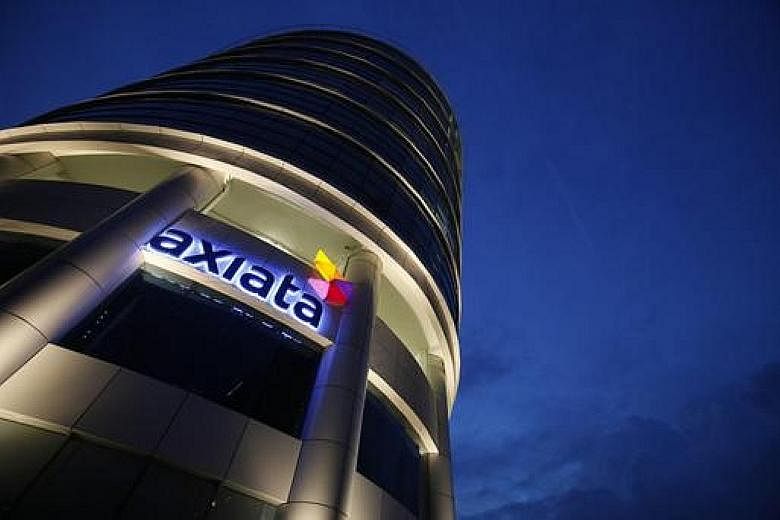Regional telecommunications giant Axiata counts the Malaysian government as a major shareholder, like many other billion-dollar state-linked companies controlled by the country's sovereign fund Khazanah Nasional.
Yet Axiata's returns trail behind others in the Khazanah stable, contributing just 2.7 per cent annually on invested capital since 2004, against 9.9 per cent or higher at six other companies which, like Axiata, are listed on the local bourse.
The telco has 320 million mobile phone subscribers in 10 countries via stakes in wholly-owned Celcom in Malaysia, Indonesia's PT XT Axiata (66.36 per cent) and Singapore's M1 (28.5 per cent).
A fortnight ago, Axiata wrote off RM3.3 billion (S$1.1 billion) due to a misadventure in the Indian cellular market, an investment that had already resulted in a RM1.1 billion impairment in 2011.
It also embarked on a concerted foray into digital services in 2014, a region-wide investment that saw it write down at least RM110 million in the past year alone.
These loss-making ventures mirror those of parent company Khazanah, whose own lacklustre showing drew pressure from the Pakatan Harapan government, causing the board to resign en masse last month.
-
Digital bet gone awry
-
Axiata first put aside US$150 million (S$205 million) to kick-start its "digital programme" in 2014, with an annual ceiling of RM250 million (S$83 million) to keep the momentum going.
Most of its 32 brands have been earmarked for divestment, and it now concentrates on three main projects - e-wallet Boost, advertising analytics service Ada and business applications platform Apigate.
It reported a RM30 million loss after exiting the now defunct Yonder music streaming platform last year. Celcom users are now asking if they will receive compensation after losing the free value-added service.
This year, Axiata also marked RM80 million in losses on its investment into Australian mobile advertising and content platform Unlockd and e-commerce venture 11street.
11street recorded operating losses of over RM100 million in each of the past two years. Meanwhile a deal to bring in PUC Berhad this year resulted in a RM40 million injection, instead of an initially planned RM90 million, with the media firm assuming management control despite holding a stake of just 12 per cent.
Sources told The Straits Times that over RM100 million was ploughed into video streaming platform Escape which made little impact before being taken offline, and the Boost e-wallet is bleeding over RM50 million per quarter as it competes in a crowded market that now includes Chinese giants AliPay and WeChat Pay.
Axiata chief executive Jamaludin Ibrahim defends these losses as part of the nature of digital investments where "you slog it out for... four, five years, even more sometimes" initially, and expects Boost to break even in 2021, as it is currently the largest e-wallet service in Malaysia with three million users and 35,000 merchants signed up.
Shannon Teoh
"Funny things" and "obvious wrongdoings" was how Prime Minister Mahathir Mohamad described the goings on at Khazanah, which was accused of bailing out 1MDB when the debt-riddled state firm was short of billions last year.
Malaysia's sovereign fund controls a wide range of companies including regional banking group CIMB, IHH Healthcare that owns the Gleneagles, Mount Elizabeth and Parkway brands, along with companies that operate Malaysian airports and power companies.
Sensational headlines, including losing RM1.7 billion in a punt on investment bank UBS and dumping RM80 million into an online lingerie platform in India, helped make the new government's case for a leadership revamp.
Supporters of former Khazanah managing director Azman Mokhtar insist he picked more winners than losers, tripling the assets he was entrusted with in May 2004 to RM157 billion as at December 2017.
To his critics, the returns have fallen short of the broader market. Khazanah gave taxpayers a 9.6 per cent cumulative annual return in that time, lower than the performance of the benchmark Kuala Lumpur Composite Index at 9.7 per cent. In other words, simply investing in Malaysia's top listed companies during that period would have been more rewarding.
"Taxpayers will measure the sovereign against other fund managers. Even more so when your companies operate in non-competitive environments or are outright monopolies. The barometer for success should be higher," Vriens & Partners' risk analyst Adib Zalkapli told The Straits Times.
In Malaysia, Axiata's subsidiary Celcom is part of an effective "triopoly" in mobile services with two other companies, Maxis and Digi.
Celcom has fallen from having the most mobile customers in 2015 to the fewest among the big three, and tales of disgruntlement at management decisions are an open secret in the industry.
In an internal memo seen by The Straits Times, Celcom chief executive Michael Kuehner announced a restructuring earlier this month which moved procurement out of the finance department, by creating the role of chief strategy and procurement officer. The CEO - whose contract will not be renewed after it expires on Aug 31 - is taking temporary charge of procurement until the new position is filled.
"It's bad governance when the CEO can decide on procurement, and has led to bad blood in Celcom's top management," a source said, pointing to the usual practice of placing procurement under the chief financial officer, to have proper checks and balances.
After Axiata's quarterly review last Friday, incoming CEO Idham Nawawi confirmed that the new position would come under his office and added that "it will be one of the first things I will look at" when he clocks in on Sept 1.
At the review, Axiata's CEO Jamaludin Ibrahim justified the telco's several failed investments - funded by its RM250 million annual kitty for digital ventures - as an "experiment" to "learn with a view that even if we lose every single cent, it's okay". He said: "Our revenue is about RM25 billion and RM250 million is very small in that respect."
Still, it was a costly experiment compared against profits, which came in at RM909 million last year and RM504 million in 2016.

